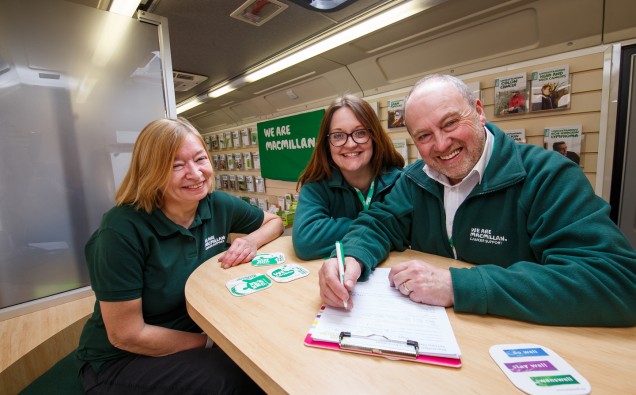Free, cancer advice and support is coming to West Midlands between Tuesday 16th May and Thursday 18th May. Macmillan Cancer Support’s mobile service will be visiting the area, with cancer information specialists on hand to answer questions and provide information. The team encourages anyone with worries relating to cancer to stop by, whether you’re living with cancer, or care for someone who is. Now that summer is on the way, the team will also be providing specialist advice and information about sun safety and skin cancer (though please note the team will be unable to perform skin checks.)
Details of the visit:
Tuesday 16th May
Wolverhampton, Queen Square, WV1 1TQ
10am to 4pm
Wednesday 17th May
Walsall, Park Street, Outside Poundland, WS1 1LJ
10am to 4pm
Thursday 18th May
Birmingham, High Street, Outside M&S, B4 7SS
9am to 6pm
The number of people developing melanoma, the most deadly form of skin cancer, is continuing to rise, with around 110,330 people living with malignant melanoma in the UK, and 13,500 people diagnosed every year, (around 37 people every day)1. It is the fifth most commonly diagnosed cancer in the UK, and slightly more common in women than in men2.With all of the varying types combined, skin cancer is the most common cancer in the UK.
Julie Banks, a Macmillan Information and Support Specialist on the unit, said: “Skin cancer, if caught early, is very treatable and actually has one of the highest survival rates of all cancers. Being sun aware is key. Our advice is to avoid sun beds, wear a high SPF sun screen with a four-star rating or more so it will block out UVA as well as UVB rays, and cover up in the sun.”
To help keep you safe in the sun, the British Association of Dermatologists advises following these top sun protection tips below:
- Spend time in the shade during the sunniest part of the day when the sun is at its strongest, which is usually between 11am and 3pm in the summer months.
- Avoid direct sun exposure for babies and very young children.
- When it is not possible to stay out of the sun, keeping yourself well covered, with a hat, T-shirt, and sunglasses can give you additional protection.
- Apply sunscreen liberally to exposed areas of skin. Re-apply every two hours and straight after swimming or towelling in order to maintain protection.
The below guide is a useful tool for checking your skin for the signs of melanoma skin cancer, which you should do once a month. If you have any concerns make an appointment to see your GP.
- Asymmetry – the two halves of the area may differ in shape
- Border – the edges of the area may be irregular or blurred, and sometimes show notches
- Colour – this may be uneven. Different shades of black, brown and pink may be seen
- Diameter – most melanomas are at least 6mm in diameter. Report any change in size, shape or diameter to your doctor
- Expert – if in doubt, check it out! If your GP is concerned about your skin, make sure you see a Consultant Dermatologist, the most expert person to diagnose a skin cancer. Your GP can refer you via the NHS
Signs of non-melanoma skin cancer may include:
- A scab or sore that won’t heal. It may also bleed occasionally
- A scaly or crusty patch of skin that looks red or inflamed
- A flesh coloured, pearly lump that won’t go away and appears to be growing in size
- A lump on the skin which is getting bigger and that may be scabby
- A growth with a pearly rim surrounding a central crater, a bit like an upturned volcano
Julie added: “We’re also there for anyone else with any worries or concerns, no matter what type of cancer. Whether you’ve just been diagnosed, are going through treatment or are living beyond cancer, feel free to pay us a visit – and we welcome carers, family members and loved ones as well. We can provide information on a range of issues, including different treatments, financial advice, exercise, getting back to work, or what local services might be on offer for you. You can even just stop by for a chat, no appointment needed.”
For further information about Macmillan’s mobile information service, and planned visits, go to http://www.macmillan.org.uk/aboutus/contactus/mobileinformationcentrelocations.aspx
If you are unable to visit the unit but have questions about cancer, visit www.macmillan.org.uk or call Macmillan free on 0808 808 00 00 (Monday to Friday, 9am to 8pm). You can find out about Macmillan services near you at http://www.macmillan.org.uk/in-your-area/choose-location.html
If you are unable to visit the unit but have questions about cancer, visit www.macmillan.org.uk or call Macmillan free on 0808 808 00 00 (Monday to Friday, 9am to 8pm). You can find out about Macmillan services near you at http://www.macmillan.org.uk/in-your-area/choose-location.html


















